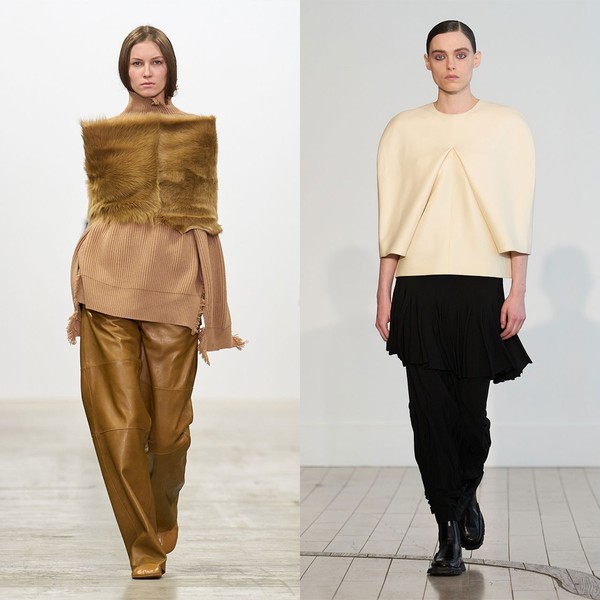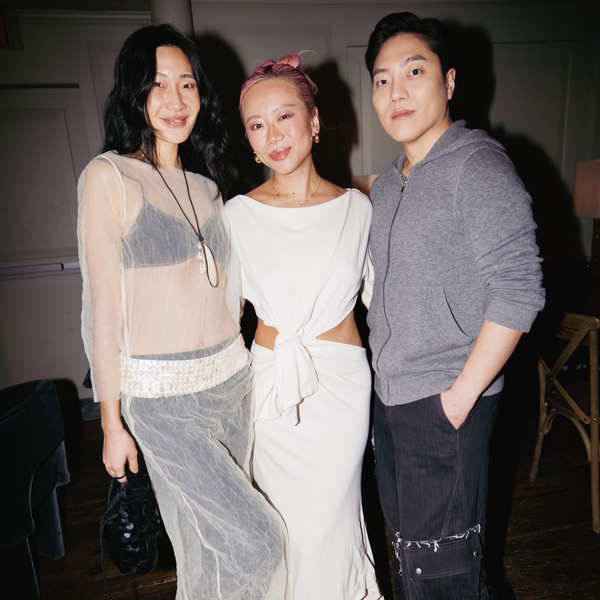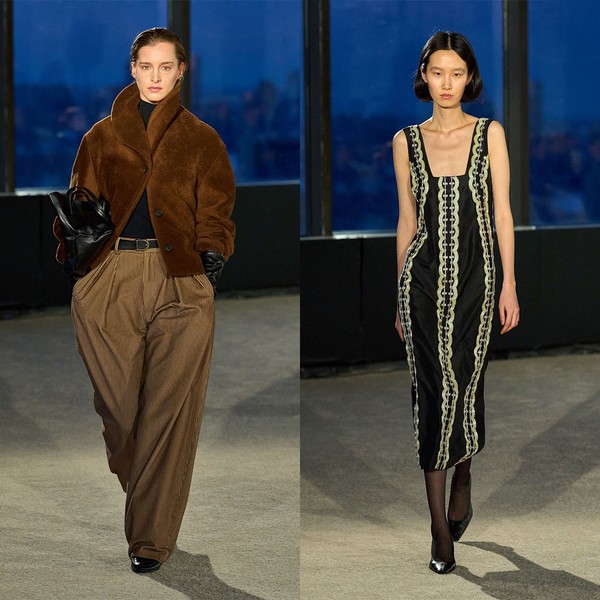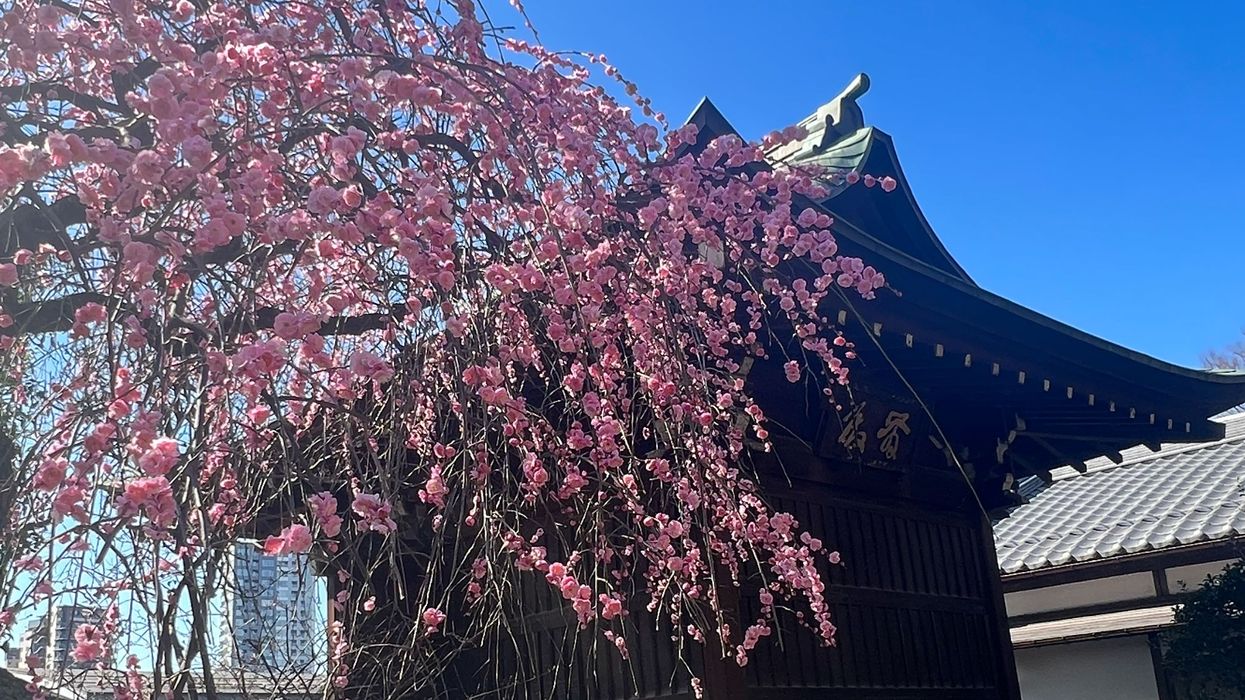
According to the internet, the best time to visit Tokyo is during the beautiful but brief cherry blossom season, which typically begins in late March. I prefer Tokyo earlier in March when it’s less tourist-infested. Plus, you still might find cherry blossoms, or sakura, like I did on a morning stroll through Shinjuku Gyoen National Garden. The sky was cloudless, the endless greenery unfurling, and an ippon-zakura—a single cherry tree—was curiously in full bloom.
Dozens swarmed the early bloomer. I weaved through the selfie-takers like a frantic, big-eyed ghost crab, inching closer to the unexpected beauty. I sensed the collective belief that at any moment, the tree would erupt from the earth, dive into the nearby pond, and vanish like an air fryer on Black Friday.
I took an Instagram selfie of myself smiling behind rose-colored, heart-shaped sunglasses that I bought in Harajuku. I aptly captioned it: “Don’t need a filter when you’re this happy!” The year was 2016. I was 29. My writing career was going well. My self-loathing New York City party-boy days were behind me. I thought I had done it all. I traveled the world on impossibly chic press trips, lasted a week in a horrific LGBTQ+ rehab, and dabbled in Buddhist chanting. I even interviewed my tween idol (Ginger Spice) for my one and only Vogue story.
I was drugged, sane, and eager to return to my shoebox-sized, roach magnet of a studio apartment on the Lower East Side. Sure, I missed my cat, but I was mostly excited to reunite with a cutie I met shortly before my trip. He was mysterious, or maybe just composed, and I was the bull in a china shop, heart-on-my-sleeve type. Still, he could never hurt me. I prematurely asked him to be my boyfriend a month later on a balmy afternoon in the Brooklyn Botanic Garden while we were lying on our backs under a fully flowered cherry tree. A gust of wind sent a pink cloud of petals into the blank sky, and we squealed and took insufferably cuddly selfies as the petals came down like confetti, lost in a life-is-beautiful daze.
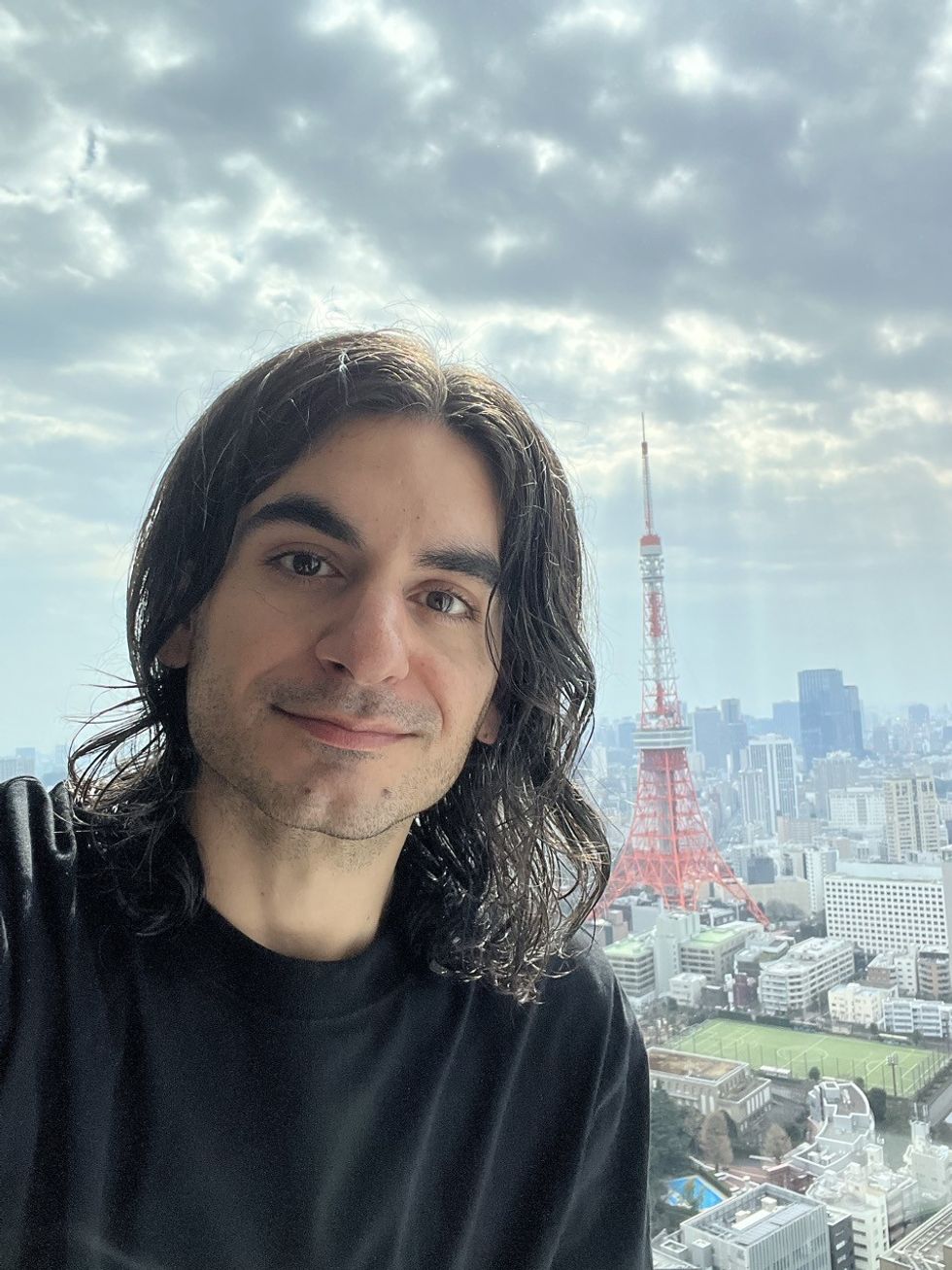
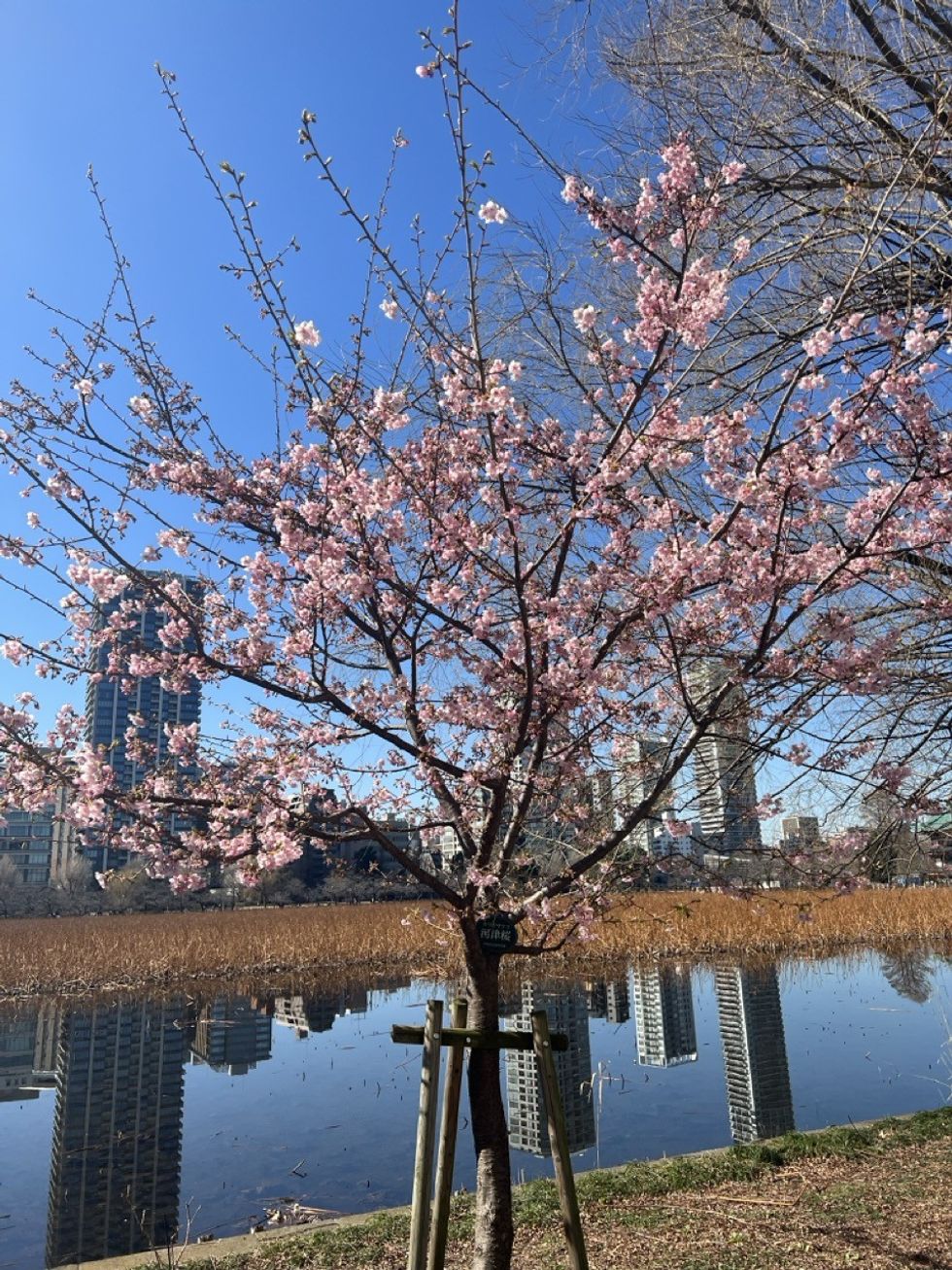
I was warned about pink clouds in a Sexual Compulsive Anonymous meeting, which I fled after twenty minutes. “Pink clouding” is the honeymoon phase that can arise early in addiction recovery. You’ve won the battle and no longer crave your drug of choice. Whoever coined the term was probably wasted at a hanami (flower viewing) party, stumbling under a canopy of cherry trees that look like levitating cotton candy when they reach “peak bloom” en masse. I knew from experience that my clouds eventually burst with toxic rain. But, at the time, the wishing to wake up as another person, the desire for a lobotomy—that was all dormant and distracted. Things were moving fast, and my first-ever boyfriend moved in with me and my judgmental cat in 2017. Right away, we were teammates. I had to keep it that way.
And then 2020 happened. I felt something sinister awakening in me, like a shrieking cicada emerging from the ground. Most people baked bread and abused substances during the lockdowns. I inexplicably woke up one day committed to pescatarianism, intermittent fasting, and home HIIT workouts. I didn’t touch alcohol or cigarettes for a year. I lost 45 pounds in five months. I convinced my psychiatrist over Zoom that, on second thought, I wasn’t bipolar, and he weaned me off the mind-flattening Lamictal I had been taking for a decade.
Life was lusterless. I was swallowed up in a daily fog. The pervasive darkness made me feel like a cornered animal. I communicated better with my cat than with my increasingly distant boyfriend. I infrequently left the apartment. I quit therapy. I moisturized. I kept my iPhone on airplane mode. I consumed superfoods, “healthy fats,” and evening re-watches of “The Real Housewives of New York City.” Something was deeply wrong. I’d ask myself how this all would end while down on my knees, finally scooping the litter box. Dorinda Medley from “RHONY” brutally answered: “Not well, bitch!” The pink cloud had gone gray.
Mask mandates lifted, I lost track of time, and my hair grew so long that, paired with my caterpillar eyebrows, I looked like Michael Imperioli in a bad wig. I remained lost in a dark trance, vacantly staring into mirrors like my frail, senile cat. I doom-scrolled on Instagram and hate-watched as “friends” launched successful podcasts and OnlyFans while I suffocated in privileged millennial ennui. Everyone was out in the world blossoming and living their best lives, including my suddenly elusive boyfriend, repelled by my mysterious misery. And I was in bed with my MacBook Air perched atop my ribcage, watching YouTube videos of designer-clad influencers giving tours of their crazily compact Tokyo apartments.
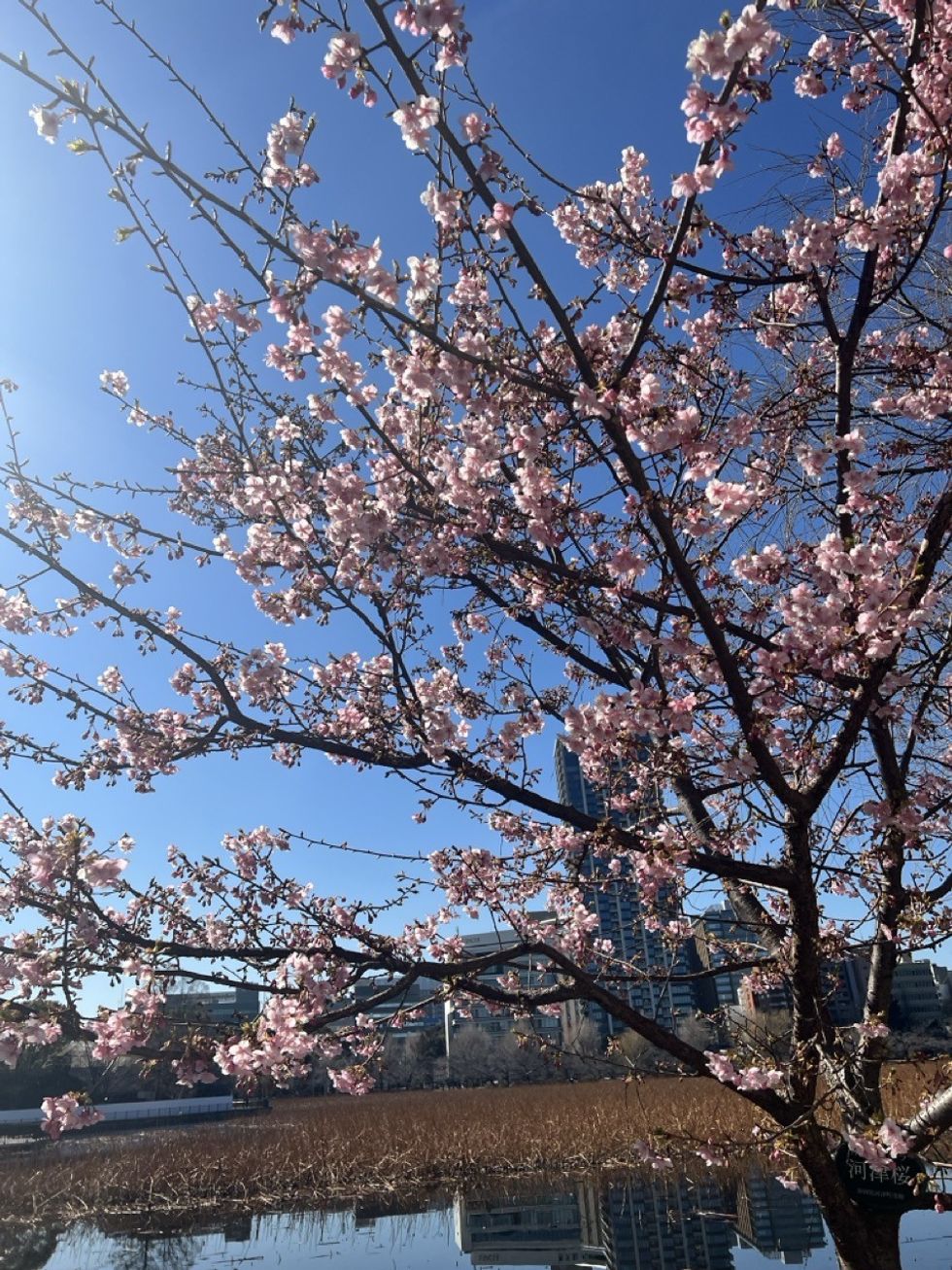
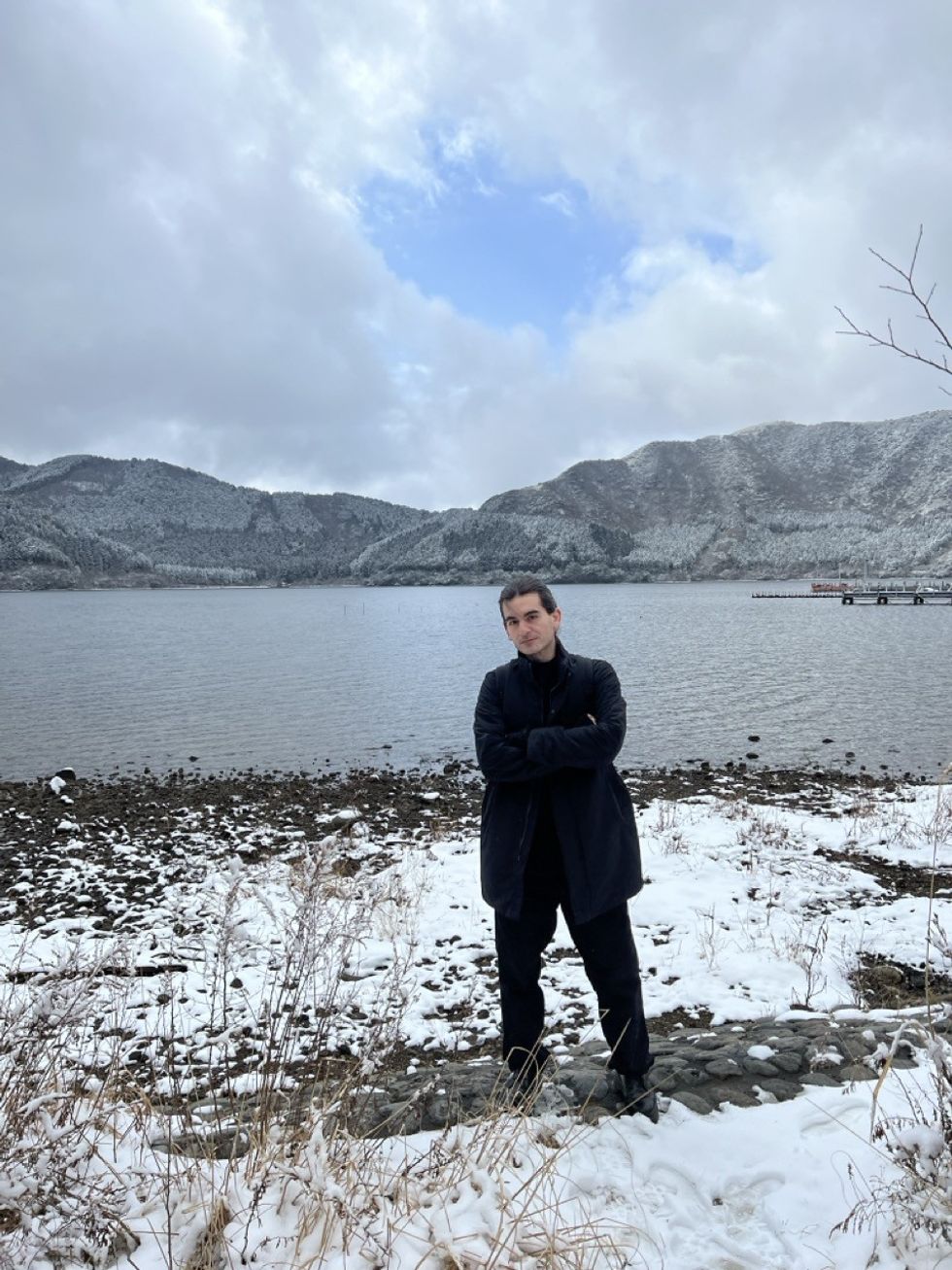
Fast forward to February 1st, 2023—four months after Japan fully reopened its borders—and I was finally back in Tokyo. I’d been several times pre-pandemic, but this trip was different. It was the first time I’d experienced Tokyo in the dead of winter and as a sullen 36-year-old. It wouldn’t be an all-expenses-paid press trip, though I did book the flights using reward miles. I wouldn’t breathlessly inform my Tokyoite friends weeks in advance to clear their calendars. I didn’t want connection. I didn’t want to disappoint anyone. I didn’t want to remove my shoes at teamLab Planets. I wouldn’t make reservations at Michelin-starred restaurants or research atmospheric speakeasies. I’d eat cheap, excellent konbini (convenience store) fare from the comfort of my budget hotel’s stiff bed, pray I didn’t lose my passport, and love every minute of my solitude. The precisely plotted itinerary was simple: I would walk around the electrifying megalopolis until my messy mind was as spotless as the city’s streets.
Along the way, I’d snap out of my zombielike state and try to figure out where I could peacefully chain-smoke without being fined (smoking while walking is forbidden). More often than not, I’d just sneakily suck on cigs in parking lots behind vending machines. Or I’d roam into a claustrophobic back alley, drop into a smoker’s squat, and puff away next to stacked crates of empty bottles. Occasionally, a restaurant’s back door swung open, causing my heart to stop, and a stone-faced cook would light up. We’d politely nod at each other but wouldn’t speak or allow our eyes to meet. We were strangers. Both alone and exhausted.
Throughout my month-long trip, I wore an all-black wardrobe and had a complexion of expired meat due to my prior homebody status in NYC. I guess I was grieving the death of the relationship: my boyfriend of seven years was giving up on us, and giving me until April to vacate his apartment. I’d been mostly unemployed since 2020, so, when he found us a spacious Alphabet City one-bedroom replete with a washer-dryer machine in the summer of 2021 and said, “Just pay what you can,” I went along with it. (Mental illness is giving up your rent-stabilized Manhattan studio apartment.)
In the Land of the Rising Sun’s capital, I went unnoticed. I was a ghost, drifting around the world’s most populous metropolis, gliding in and out of a tunnel of torii gates. Aside from French maid cosplayers passing out fliers, no one cared as I tried to get the hell out of Kabukichō, a chaotic entertainment district home to nightclubs, love hotels, and a colossal Godzilla head that looms over the neon-soaked streets. Mission accomplished: I was a nobody.
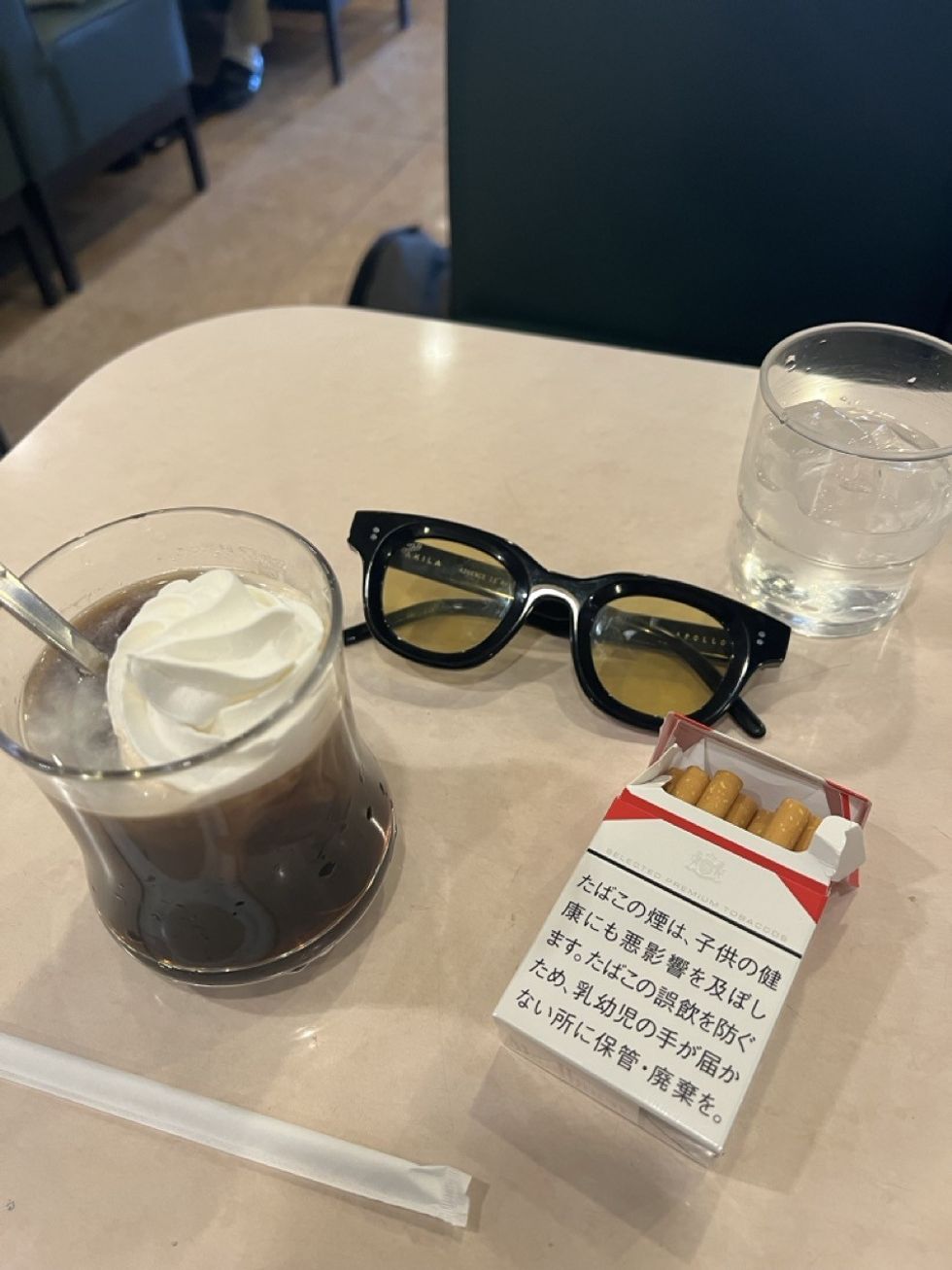
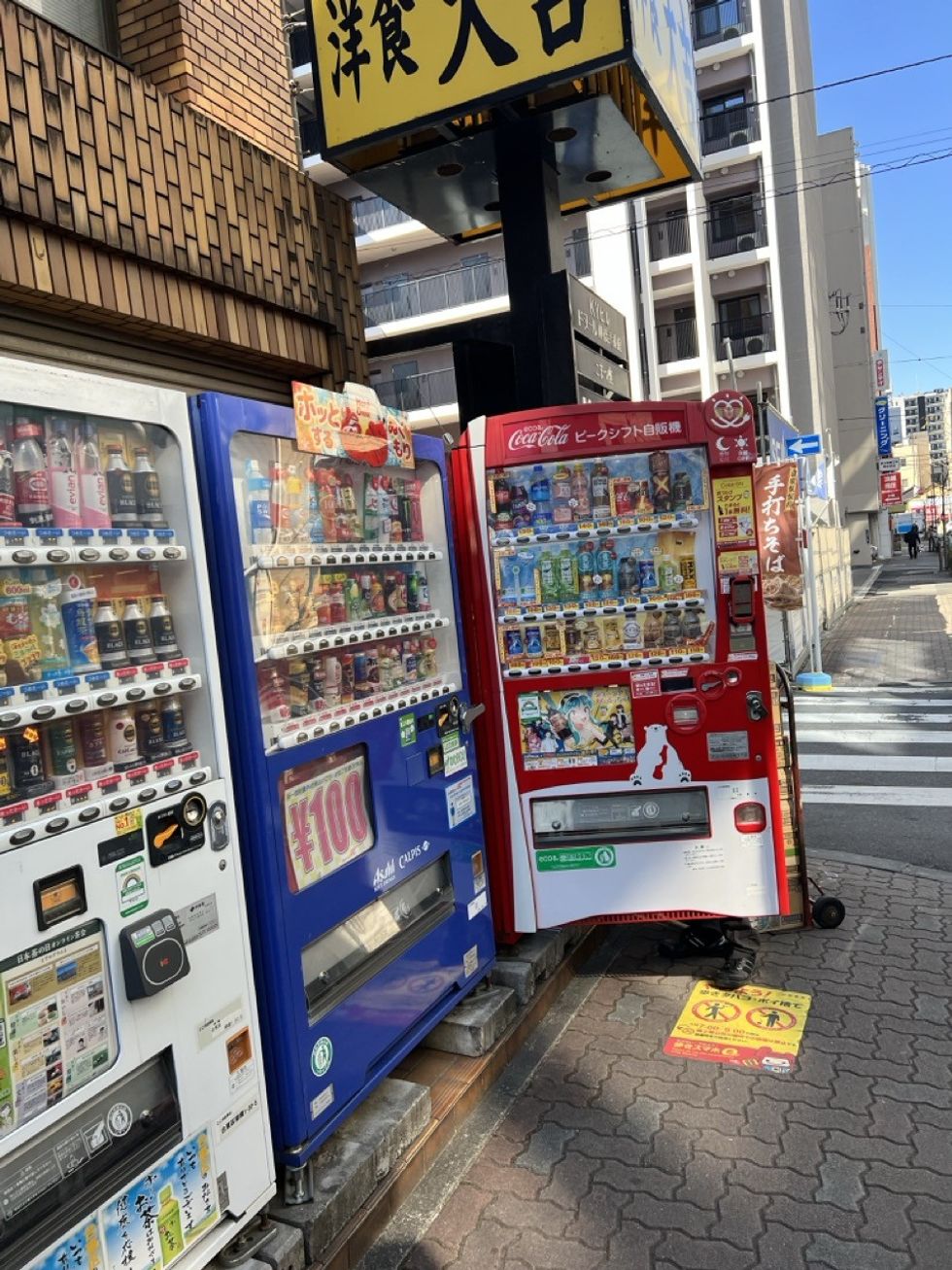
I window-shopped at dusk under the tangle of power lines on a street sprinkled with vintage shops in hip Koenji. I wandered past moodily lit bars and smoky yakitori joints tucked under elevated train tracks, stopping by a hole in the wall selling a variety of fruit sandos. I dropped my plastic-wrapped order into my tote, where it joined jangling loose yen coins and a Pocari Sweat bottle that I repurposed as an ashtray. Trains hummed from above like a white noise machine. The demented voices in my brain faded away.
I sidestepped the throngs of beanie-wearing tourists queuing for crepes on Takeshita Street. I scrambled to the smoking area outside Harajuku Station, passing boutiques selling Lolita garb, pastel-hued cosmetic stores, and a Shiba Inu cafe. I smoked with expressionless salarymen and enthusiastic Gen Zers wearing Little Bo-Peep-ish numbers paired with goth glam and ribbons. I should’ve moved here when I was still young, I wistfully thought, my veins swollen with caffeine and nicotine. A mobile billboard truck blasting J-Pop music drove by, its sides plastered with a portrait of a poreless, painfully pretty boy idol band. I pondered plastic surgery.
I sat slumped on a bench facing a narrow street in the sleepy Gotokuji district of Setagaya ward, gnawing inelegantly at a roasted purple sweet potato’s piping hot skin at ten in the morning. Its spiky, shimmering flesh evoked amethyst quartz, and I briefly got a much-needed ¥500 facial via its billowing steam. Bicycles whooshed by. School buses with giddy children wearing matching bright yellow caps snaked down the curving street. Minutes before, I visited Gotokuji Temple, which, according to folklore, is the birthplace of maneki-neko, those waving cat figurines that greet customers at restaurants and shops. I purchased one for my boyfriend from the temple’s gift shop, then remembered he was my ex and soon-to-be ex-roommate. I clicked my raggedy Adidas Sambas, wishing this was the place I called home.
It was easy to disappear in Tokyo, and that’s why I kept coming back. I particularly loved performing my vanishing act on weekends in Shinjuku Ni-chome, Tokyo’s gay hub, where I’d feed my demons by feverishly gulping vodka sodas like it was my final night on earth. I’d bar hop from casual haunts the size of a Uniqlo dressing room, like AiiRO CAFE, to nightclubs illuminated by glittering disco balls, like the disco-blaring New Sazae, a Nichome fixture since the ‘70s, and the bigger AiSOTOPE Lounge, where fog machines, exquisite drag queens, and thong-wearing go-go boys with WWE wrestler forearms abounded. After anywhere from three to eight cocktails, I felt human again. Bizarrely confident. It was the closest I’d gotten to “feeling like myself” in years. This meant it was probably somewhere between 2 and 4 a.m., and it was time for me to wobble to 24 Kaikan, the local hattenba a.k.a. the glorious gay sauna.
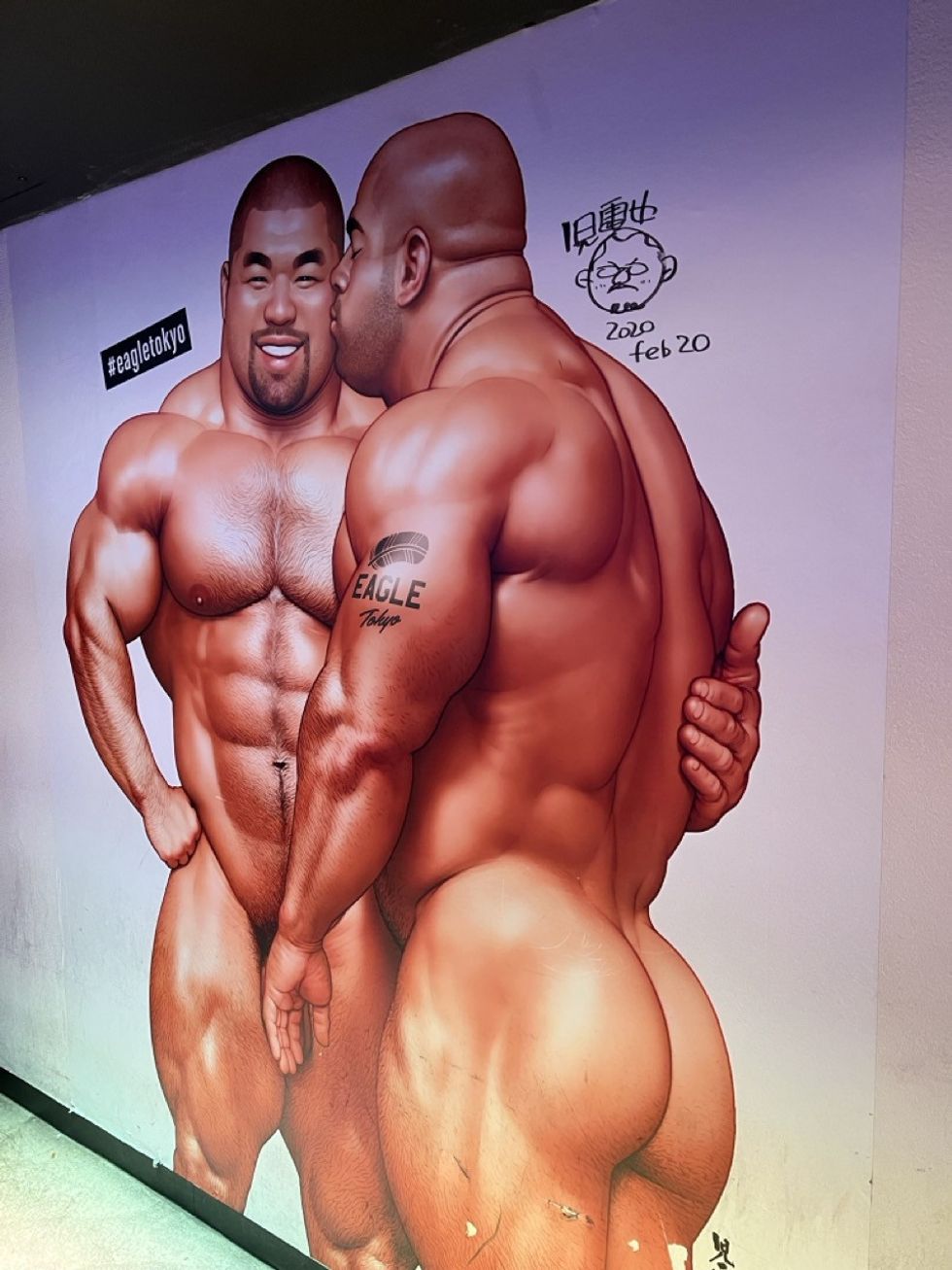
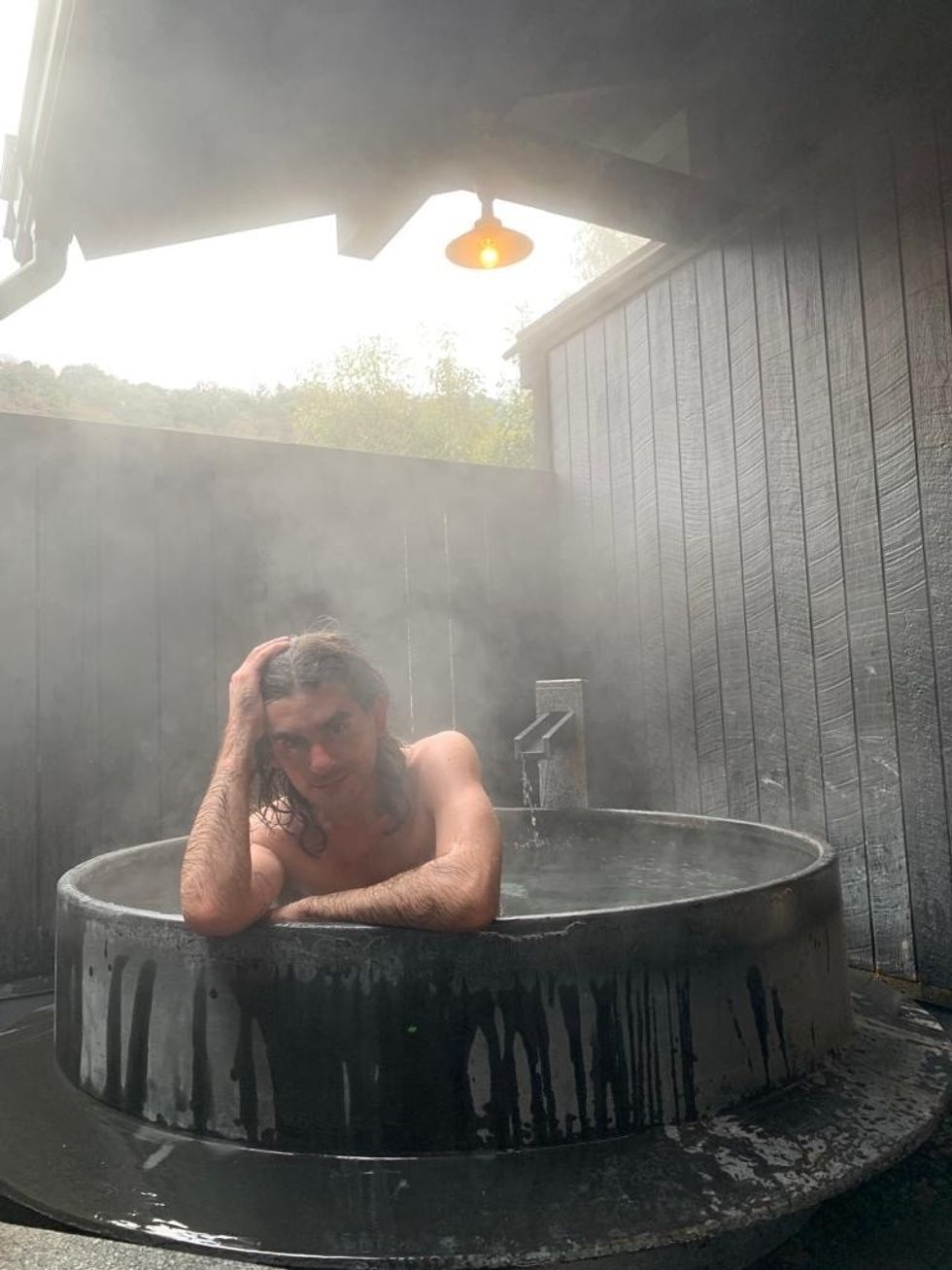
My innumerable nights at 24 Kaikan over the years usually go like this: I drop my towel and squat down to join a row of naked strangers seated on low plastic stools and facing a wall of faucets, pump bottles of overly scented toiletries, and cloudy mirrors. Some gracefully empty buckets of soapy water down their backs. Others furiously scrub their bodies. Behind us, an audience of additional nude onlookers soaks in a scalding pool of water. I rise and dramatically dry off for them. They’re unmoved. Then, I avoid fainting during sex in the steam room or dry sauna and instead, prance off to the communal “sleeping” room.
Packed with a maze of floor mattresses and bunk beds, the dark, cavernous space looks like a gay-only hostel dormitory in desperate need of new carpeting. Some men hook up in the shadows. Most snore like sedated hogs, likely because they missed the last train home (they stop running around midnight until about 5 a.m.). I once stayed overnight in a top bunk, and the symphony of snores and moans did not lull me to sleep. Up there is where I “met” Jin.
If stimulants weren’t illegal in Japan, I’d be convinced that Jin had been overprescribed Adderall. He was always ready to show me a good time when I was in town, which included dragging me to a tattoo-friendly sentō (public bathhouse) in the middle of my February 2023 trip. Jin pinched my thigh as we sat naked in an outdoor stone-edged pool across from a posse of tattooed hetero hunks, who relaxed with their eyes shut, cloth folded into squares on top of their heads, steam wafting around their devastatingly perfect pecs that made me wish I carried an inhaler. “YAKUZAAA!” Jin failed to whisper in my ear, causing my pasty chest to turn lava-hued.
We enjoyed each other’s company, probably because we never had deep conversations. I didn’t know his last name, but I knew he was a forty-something hairdresser from Shinagawa who wore fake designer baseball caps and a big smile. His English was great for surface-level chats. My Japanese was limited to a few vocabulary words and basic greetings. When things got complicated, Jin would use a translation app on his iPhone and then hand it to me. One day, it read, “Want to go to Hakone tomorrow night after I get off work?”
The passenger train car was silent and mostly empty; Jin was affectionate and chatty. A bag of butter and soy sauce-flavored potato chips squeaked when he ripped it open. After eating, Jin rested his head on my shoulder. A salaryman in the opposite row collected his newspaper and briefcase and moved to the back of the car. When we woke an hour later, I noticed a menacing snow through the window. I brought up the old woman with the lilac-colored bob who told us not to travel to Hakone tonight. “Daijoubu,” Jin said, smiling.
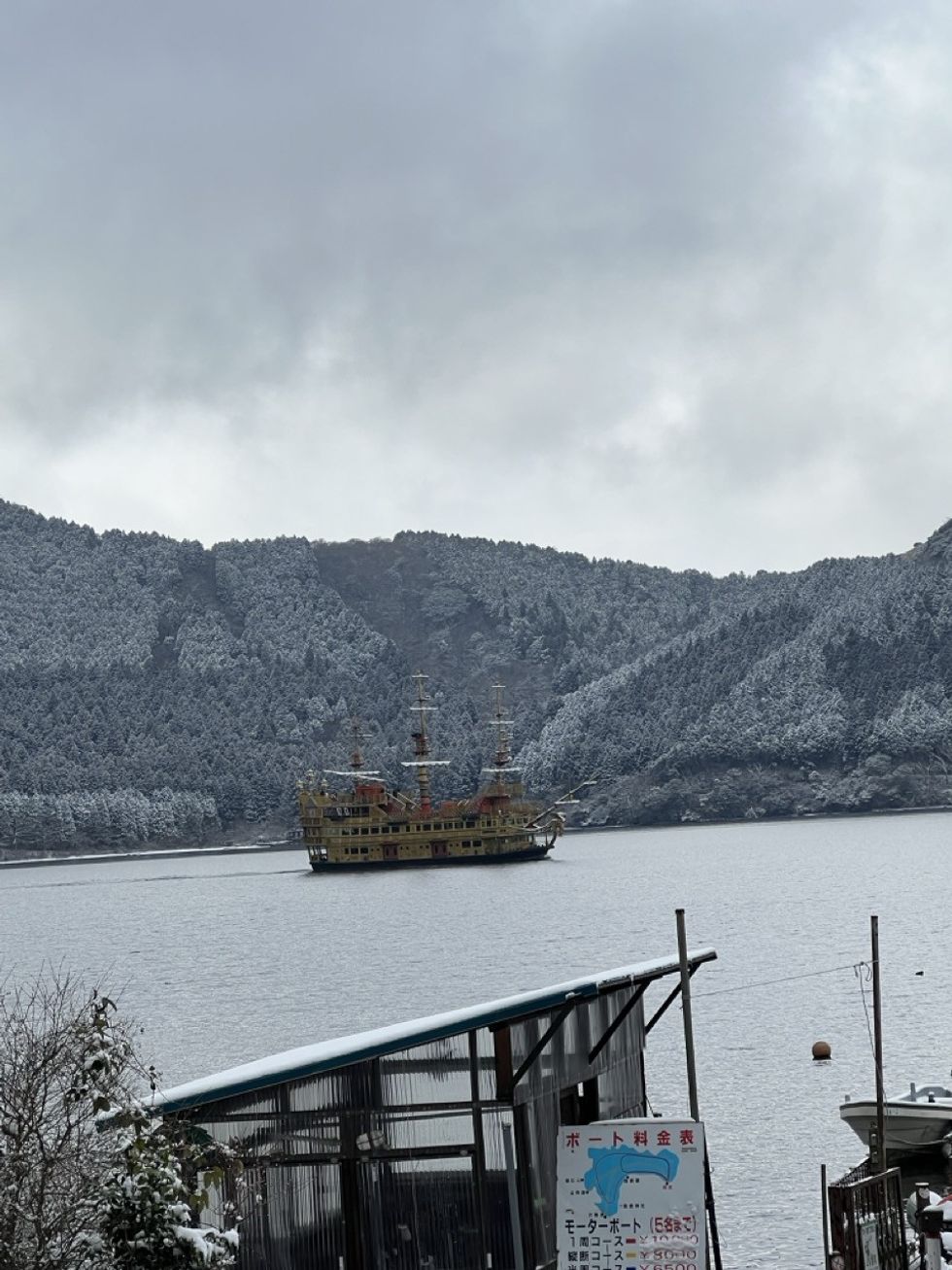
Lake Ashi
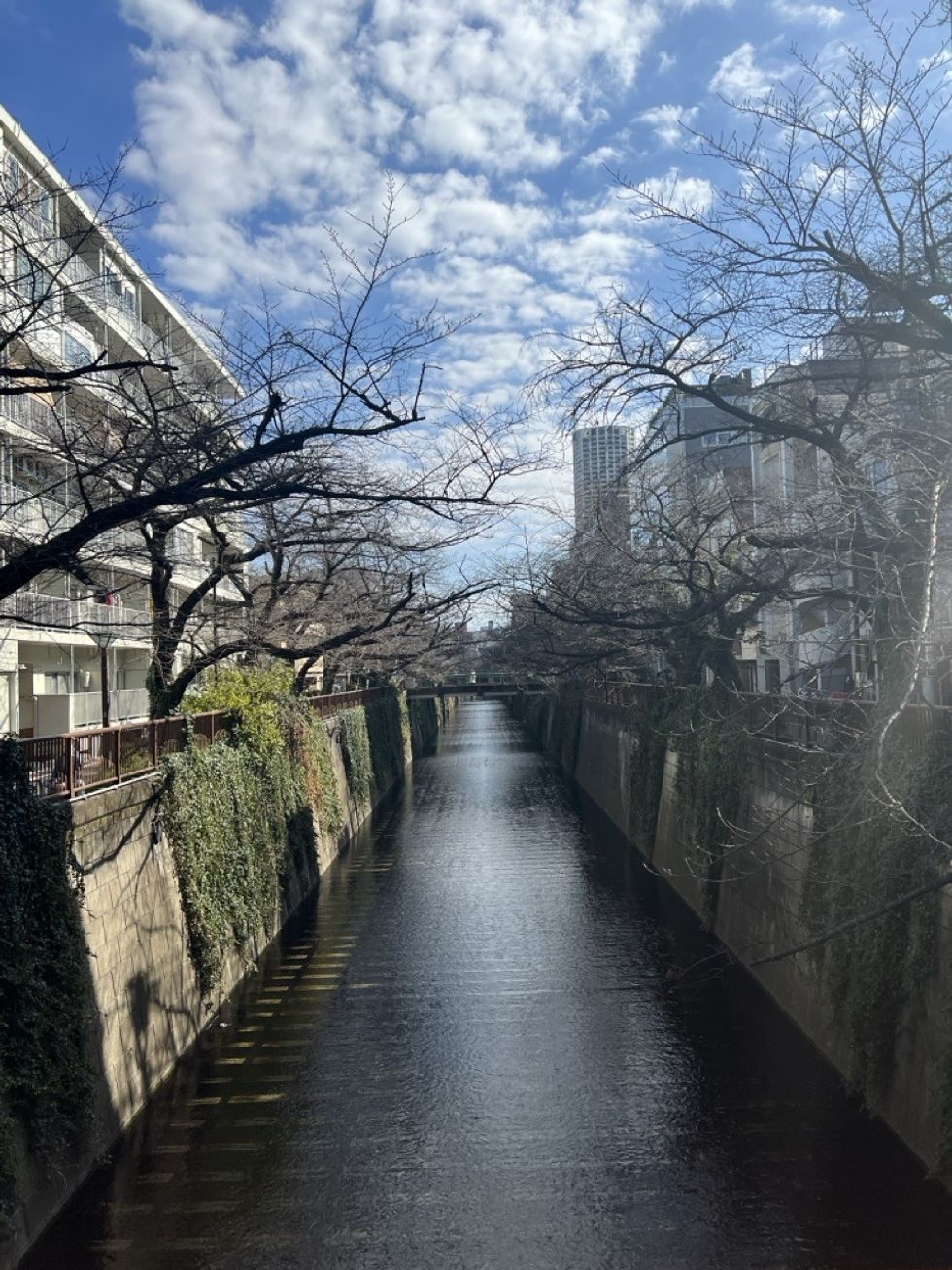
He wasn’t wrong. Everything was going to be fine in the mountainous hot springs town. When we arrived, its blizzard-stricken environs gave off The Shining vibes. But by morning, the snowfall was over. The frosty air was invigorating, the mountains were snow-coated, and the sky was an acid-washed charcoal, akin to my favorite American Apparel skinny jeans circa ‘08.
Jin took the wheel. He had the entire day planned. Our first stop was an uber-posh onsen (hot spring) resort that forbade tattoos due to their association with yakuza. I have several unfortunate ones, so we booked a rent-by-the-hour private room featuring an open-air bath brimming with boiling, mineral-rich spring water and cinematically lush vistas. Had I proposed to my boyfriend instead of setting the relationship on fire, this could’ve been a very naked stop on our honeymoon.
Next, we took a ride on the Hakone Ropeway, where we sat in a glass box that flew above what, according to Jin, was an active volcanic valley. In Japan, I almost never knew what I was looking at, particularly when my iPhone wasn’t connected to WiFi. The sulfurous fumes escaping from the cracks in the rocky grounds far down below us looked like the plumes of steam belching from a manhole back in Manhattan.
An hour later, we reached Lake Ashi, which formed about 3,000 years ago after a volcanic eruption. Mountains with snow-shrouded trees soared over the lake, its inky water rippling as a tacky replica of a pirate ship breezed by. It was as if I’d stepped into a Bob Ross painting. Puffy clouds enveloped the sky and Jin told me that on a clear day, you could see Mount Fuji. My eyes fogged up like a bathroom mirror. I forgot how to blink as I stood there staring out at nothing. But I knew there was a powerful beauty in the distance cloaked in clouds. Maybe it wished to disappear. But it was still there. It was still beautiful.
I went on another walk alone on my last day in Tokyo. I roamed the streets of old-school Yanaka, where wooden homes bathed in sunlight. I climbed a stone stairway leading to the winding paths of Yanaka Cemetery, passing ginkgo trees and ornate gravestones. I wandered Ueno Park, which houses museums, temples, a zoo, and, according to the internet, over 1,000 cherry trees. But it was February and they were dormant. Then I stumbled upon another early bloomer alongside Shinobazu Pond. A cluster of happy humans gathered around the Studio Ghibli-esque stunner, iPhones raised. I sent a photo of it to Jin via WhatsApp. Before I could type “global warming?” he replied that it was probably a kawazu-zakura, a winter cherry tree, and then asked how early my flight was in the morning.
I didn’t want to think about it, but maybe things weren’t so bad back in NYC. Maybe I wasn’t losing my best friend. Maybe I wouldn’t delete the 391 photos of him from my phone. Maybe I was in control? Yes! I’d move out peacefully, then quit smoking and get back on meds. I’d reconnect with my friends and nab a financially stable job. I’d think of Jin’s smile and zest for life. I’d go for long walks, see through the dark clouds, and find unexpected beauty everywhere. I’d never be forced back into hiding or allow my broken brain to convince me that I am alone, that nothing matters, that I should just hop in front of a train and get it over with already. The sun keeps rising and the earth keeps spinning. You learn how to move on. To lose things.
Or maybe I’ve learned nothing, I reconsidered, mid-swallow of a Klonopin hours later on a Japan Airlines flight to J.F.K. I closed my eyes. My sinuses were dry, my teeth were clenched, and my head was a mess. I was gone again, floating above the clouds. Wishing they were still pink.

